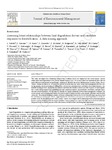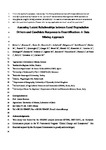Assessing the effectiveness of sustainable land management policies for combating desertification: A data mining approach.
| dc.contributor.author | Salvati, L | |
| dc.contributor.author | Kosmas, C | |
| dc.contributor.author | Kairis, O | |
| dc.contributor.author | Karavitis, C | |
| dc.contributor.author | Acikalin, S | |
| dc.contributor.author | Belgacem, A | |
| dc.contributor.author | Solé-Benet, A | |
| dc.contributor.author | Chaker, M | |
| dc.contributor.author | Fassouli, V | |
| dc.contributor.author | Gokceoglu, C | |
| dc.contributor.author | Gungor, H | |
| dc.contributor.author | Hessel, R | |
| dc.contributor.author | Khatteli, H | |
| dc.contributor.author | Kounalaki, A | |
| dc.contributor.author | Laouina, A | |
| dc.contributor.author | Ocakoglu, F | |
| dc.contributor.author | Ouessar, M | |
| dc.contributor.author | Ritsema, C | |
| dc.contributor.author | Sghaier, M | |
| dc.contributor.author | Sonmez, H | |
| dc.contributor.author | Taamallah, H | |
| dc.contributor.author | Tezcan, L | |
| dc.contributor.author | de Vente, J | |
| dc.contributor.author | Kelly, C | |
| dc.contributor.author | Colantoni, A | |
| dc.contributor.author | Carlucci, M | |
| dc.date.accessioned | 2016-09-30T11:02:11Z | |
| dc.date.available | 2016-09-30T11:02:11Z | |
| dc.date.issued | 2016-12-01 | |
| dc.identifier.issn | 0301-4797 | |
| dc.identifier.issn | 1095-8630 | |
| dc.identifier.uri | http://hdl.handle.net/10026.1/5517 | |
| dc.description.abstract |
This study investigates the relationship between fine resolution, local-scale biophysical and socioeconomic contexts within which land degradation occurs, and the human responses to it. The research draws on experimental data collected under different territorial and socioeconomic conditions at 586 field sites in five Mediterranean countries (Spain, Greece, Turkey, Tunisia and Morocco). We assess the level of desertification risk under various land management practices (terracing, grazing control, prevention of wildland fires, soil erosion control measures, soil water conservation measures, sustainable farming practices, land protection measures and financial subsidies) taken as possible responses to land degradation. A data mining approach, incorporating principal component analysis, non-parametric correlations, multiple regression and canonical analysis, was developed to identify the spatial relationship between land management conditions, the socioeconomic and environmental context (described using 40 biophysical and socioeconomic indicators) and desertification risk. Our analysis identified a number of distinct relationships between the level of desertification experienced and the underlying socioeconomic context, suggesting that the effectiveness of responses to land degradation is strictly dependent on the local biophysical and socioeconomic context. Assessing the latent relationship between land management practices and the biophysical/socioeconomic attributes characterizing areas exposed to different levels of desertification risk proved to be an indirect measure of the effectiveness of field actions contrasting land degradation. | |
| dc.format.extent | 754-762 | |
| dc.format.medium | Print-Electronic | |
| dc.language | en | |
| dc.language.iso | en | |
| dc.publisher | Elsevier BV | |
| dc.subject | Multivariate statistics | |
| dc.subject | Human pressure | |
| dc.subject | Indicators | |
| dc.subject | Response assemblage | |
| dc.subject | Mediterranean region | |
| dc.title | Assessing the effectiveness of sustainable land management policies for combating desertification: A data mining approach. | |
| dc.type | journal-article | |
| dc.type | Journal Article | |
| plymouth.author-url | https://www.webofscience.com/api/gateway?GWVersion=2&SrcApp=PARTNER_APP&SrcAuth=LinksAMR&KeyUT=WOS:000385900000034&DestLinkType=FullRecord&DestApp=ALL_WOS&UsrCustomerID=11bb513d99f797142bcfeffcc58ea008 | |
| plymouth.issue | Pt 3 | |
| plymouth.volume | 183 | |
| plymouth.publication-status | Published | |
| plymouth.journal | Journal of environmental management | |
| dc.identifier.doi | 10.1016/j.jenvman.2016.09.017 | |
| plymouth.organisational-group | /Plymouth | |
| plymouth.organisational-group | /Plymouth/Faculty of Science and Engineering | |
| plymouth.organisational-group | /Plymouth/Faculty of Science and Engineering/School of Geography, Earth and Environmental Sciences | |
| plymouth.organisational-group | /Plymouth/REF 2021 Researchers by UoA | |
| plymouth.organisational-group | /Plymouth/REF 2021 Researchers by UoA/UoA14 Geography and Environmental Studies | |
| plymouth.organisational-group | /Plymouth/Research Groups | |
| plymouth.organisational-group | /Plymouth/Research Groups/Centre for Research in Environment and Society (CeRES) | |
| plymouth.organisational-group | /Plymouth/Research Groups/Centre for Research in Environment and Society (CeRES)/CeRES (Reporting) | |
| plymouth.organisational-group | /Plymouth/Users by role | |
| plymouth.organisational-group | /Plymouth/Users by role/Academics | |
| dc.publisher.place | England | |
| dcterms.dateAccepted | 2016-09-03 | |
| dc.rights.embargodate | 2017-9-17 | |
| dc.identifier.eissn | 1095-8630 | |
| dc.rights.embargoperiod | Not known | |
| rioxxterms.versionofrecord | 10.1016/j.jenvman.2016.09.017 | |
| rioxxterms.licenseref.uri | http://www.rioxx.net/licenses/all-rights-reserved | |
| rioxxterms.licenseref.startdate | 2016-12-01 | |
| rioxxterms.type | Journal Article/Review |



